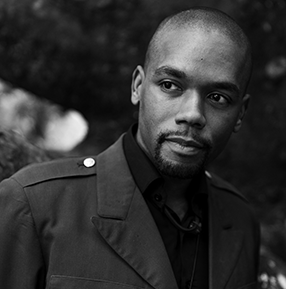What’s Left Behind After a Hawk Has Seized a Smaller Bird Midair
for Jericho, with thanks to Carl Phillips
I like men who are cruel to me;
men who know how I will end;
men who, when they touch me,
fasten their shadows to my neck
then get out my face when certain
they haven’t much use for being seen.
I like men to be cruel to me.
Any men who build their bodies into
widths of doors I only walk through
once will do. There’s a difference
between entrances and exits I don’t
have much use for now. I’ve seen
what’s left behind after a hawk
has seized a smaller bird midair.
The feathers lay circled in prattle
with rotting crab apples, grasses passing
between the entrances and exits
of clover. The raptor, somewhere
over it, over it. Cruelty where?
The hell would grief go in a goshawk?
It’s enough to risk the open field,
its rotten crab apples, grasses passing
out like lock-kneed mourners in sun.
There I was, scoping, scavenging
the damage to drag mystery out of
a simple read: two animals wanted
life enough to risk the open field
and one of them took what it hunted.
Each one tells me he wants me
vulnerable. I already wrote that book.
The body text cleaved to the spine,
simple to read as two animals wanting
to see inside each other and one
pulling back a wing to offer—See?
Here—the fastest way in or out
and you knew how it would end.
You cleaved the body text to the spine
cause you read closely. You clock damage.
It was a door you walked through once
before pivoting toward a newer image of risk.
Copyright © 2020 by Justin Phillip Reed. Originally published in Poem-a-Day on March 10, 2020, by the Academy of American Poets.
“This poem emerged by treating as true an assessment of me that was declared to me: You like men who are cruel to you. Fine. Meanwhile, I had written several drafts and fragments of poems that obsessed over the single image of a circle of feathers strewn atop the grass of a backyard I used to have, which bothered me for at least two years, and which Carl Phillips elucidated for me as ‘what's left behind after a hawk has seized a smaller bird in midair.’ The assessment and the image shuffled forms of my usual questions: What is natural (about) violence/dominance/power/resistance among animals, including people? And what, if anything, does it have to do with my ‘speciesistic’ tendency to rationalize, or my poetical desire to magnify? In addition to maintaining a three- and four-beat line for its occasion, the poem uses a villanelle-y formal device that I cooked up in the margin of my notebook while bored at a poetry reading, and which arranges repetitions as links of chain—forcing a lull of time and distance (in which change could happen) against saying a thing I’ve said before, as happens in relationships, politics, poetry, blues, etc.”
—Justin Phillip Reed

